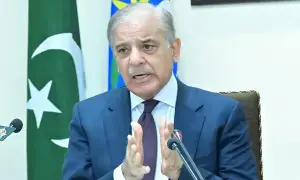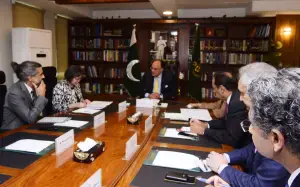New taxes on shares, weddings as GST rate goes up
4 min readISLAMABAD: The federal government has presented a finance bill for a mid-year fiscal adjustment in Parliament introducing new taxes on events held in marriage halls and trade of shares.
Finance Minister Ishaq Dar tabled the bill.
The government is aiming to take drastic measures to deal with the IMF’s tax collection goals.
The government has increased general sales tax (GST) to 18%. This alone will amount to Rs50 billion in taxes.
Duty on luxury imports is to be raised to 25%, with the government hoping to save Rs60 to 70 billion.
Duty on beverages has been increased to 25%. According to the finance bill a new advanced income text has been introduced on the events held in marriage hall.
Another new text has been introduced on the trade of shares at the rate of 10%.
The government is also aiming to add Rs10 to the levy on diesel. Cigarettes and plane tickets will also become expensive.
The increase in the GST will result in the price hike of hundreds of consumer products ranging from biscuits to shaving blades and cosmetics.
Alvi turns refuses to promulgate ordinance
President Arif Alvi has rejected the government’s request for a mini-budget ordinance as Prime Minister Shehbaz Sharif-led cabinet tries to placate the IMF to secure more than $1 billion in funding under the loan program.
“It would be more appropriate to take Parliament into confidence on this important subject and that a session be called immediately so that the bill was enacted without delay,” he said during a conversation with Finance Minister Ishaq Dar, who called on him at the Aiwan-e-Sadr in Islamabad on Tuesday.
Alvi’s response came when Dar shared that the government wanted to raise additional revenue through taxes by promulgating an ordinance.
The finance czar was apprising the president of the progress in talks with the international lender and all modalities that had been agreed upon.
Pakistan and the IMF resumed talks on the ninth review of the loan programme in a virtual meeting on Monday, following week-long in-person negotiations that failed to make headway last week.
Talks centre around reaching an agreement on a reforms agenda under the country’s $6.5 billion bailout programme, which it entered in 2019.
Though the international lender welcomed Pakistan’s commitment to take necessary measures to improve its economic situation it clarified that more discussions would be needed before an agreement is reached.
In the meantime, Finance Minister Ishaq Dar-led Economic Coordination Committee has taken several decisions to meet the lender’s condition. It has approved the electricity surcharge and ratcheted up gas prices from 16.6% to 124%.
“The speculation about Rs500 billion to 600 billion being added to taxes was false, the real amount of tax came to Rs170 billion. We will try to make sure that no burden is passed on to the common person,” Dar said in a press conference after talks concluded with the IMF delegation.
Economic expert Mehtab Haider has described the funding as important for Pakistan to avoid default. Defence, development, government pensions and subsidies are the three areas where Pakistan can cut its expenditures to bring its economy on track, he told Aaj News on February 6.
President Alvi, in a meeting with Dar, appreciated the government’s efforts in negotiating an agreement with the IMF. “The state would stand by the government’s commitments in this regard,” he added.
‘Race against time’
Ahmed Bilal Mehboob, the Pakistan Institute of Legislative Development and Transparency president, agreed with the president’s advice to the finance minister.
“Mini-budget is an important piece of legislation and it should be passed after discussion at the floor of Parliament rather than approving it in form of an ordinance,” he said while appearing at the show Faisla Aap Ka of Aaj News.
However, he also mentioned that such a concern was not kept in mind in the past as many matters were issued by the president via ordinance without taking the consent of Parliament.
“This is a race against time and we are near to default and if we do not meet those ‘conditionalities,’ including the above mentioned ordinance, set by the IMF then it will impact Pakistan’s interests,” he added.
According to Mehboob, the ordinance could only be passed through a joint session of Parliament when one of the houses does not give a go ahead to it. “It is important to sail it through the National Assembly and for this the president would be needed,” he said and stressed the need for summoning the session “at the earliest”.
For the latest news, follow us on Twitter @Aaj_Urdu. We are also on Facebook, Instagram and YouTube.




























Comments are closed on this story.